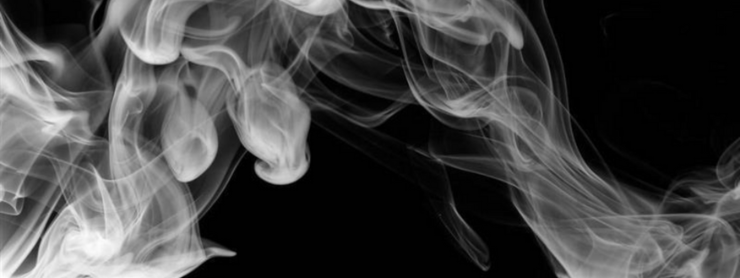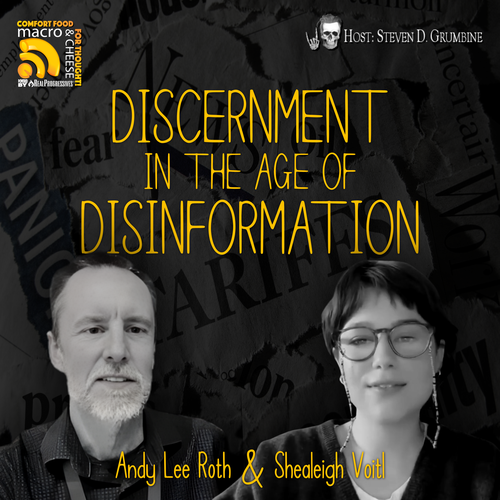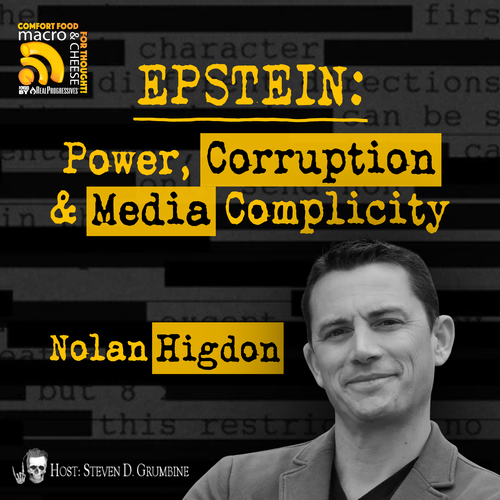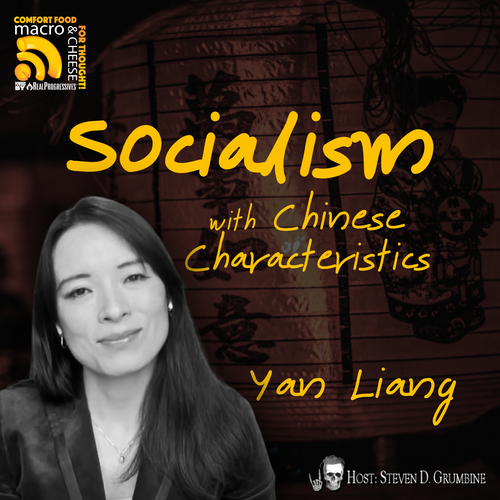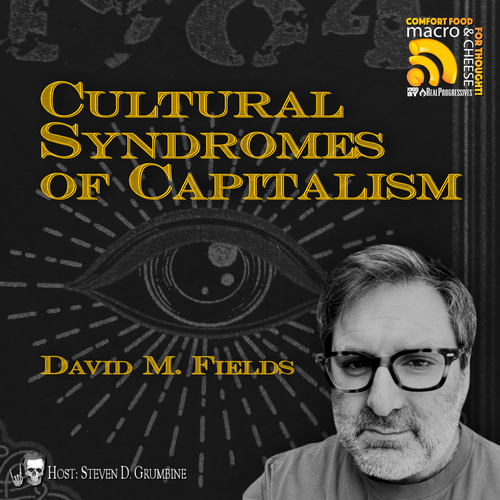Episode 273 – RP Live Presents: Putin’s Russia with Esha Krishnaswamy
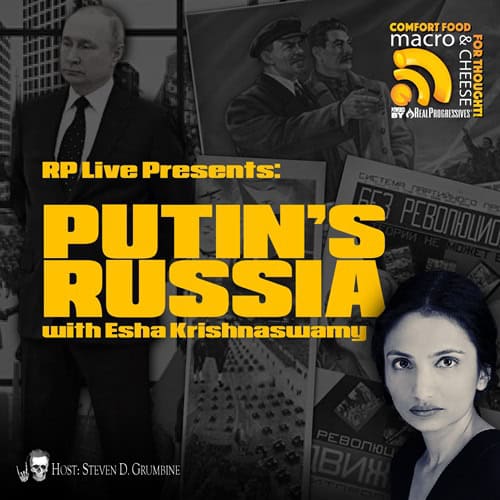
FOLLOW THE SHOW
Historian Esha Krishnaswamy on the history of modern Russia, from the Bolshevik Revolution to the Putin era.
**Check our website for upcoming events such as book clubs, RP Live webinars, and the Tuesday evening discussion group, Macro ‘n Chill. https://realprogressives.org/
This week’s episode is the audio track of a recent webinar with historian Esha Krishnaswamy. Esha is now living in Russia to research and write a people’s history of the Soviet Union.
The discussion begins with the story of the First World War and the Bolshevik Revolution. The formation of the USSR as a proletarian state shook the capitalist nations of the West to their core. As a result, the Soviet Union was regularly under threat economically, militarily, as well as propaganda warfare.
Esha talks about the history of the Soviet Union and its ultimate dissolution against the will of the majority. She delves into the impact of its fall on various countries and the global economy. She looks at the shock doctrine years of Boris Yeltsin in the 1990s and the effects of such extreme austerity and privatization on the average citizens. She then goes into the Putin era and the move towards social democracy.
Finally, she touches upon NATO, the IMF, and the war in Ukraine.
Esha Krishnaswamy is a writer and media critic, whose focus is on history, foreign policy, and Modern Monetary Theory. She hosts Historic.ly and Late Nights with Lenin.
Find her work at historicly/substack.com
@eshaLegal on Twitter
An auto-generated transcript of the RP Live event can be found on our YouTube channel here.
GUEST BIO
Esha Krishnaswamy is a writer and media critic, whose focus is on history, foreign policy, and Modern Monetary Theory. She hosts Historic.ly and Late Nights with Lenin.
Find her work at Historic.ly on Substack.
@eshaLegal on Twitter
Tweet thread mentioned in this podcast: https://x.com/historic_ly/status/1017650957105221632
Special Resources provided by our Guest:
PEOPLE MENTIONED
Putin (3:20)
Vladimir Vladimirovich Putin (born 7 October 1952) is a Russian politician and former intelligence officer who is the president of Russia. Putin has held continuous positions as president or prime minister since 1999:[e] as prime minister from 1999 to 2000 and from 2008 to 2012, and as president from 2000 to 2008 and since 2012.[f][7] He is the longest-serving Russian or Soviet leader since Joseph Stalin.
Tsar Niklolai (4:39)
Nicholas II (Nikolai Alexandrovich Romanov;18 Ma 1868 – 17 July 1918) or Nikolai II was the last reigning Emperor of Russia, King of Congress Poland and Grand Duke of Finland from 1 November 1894 until his abdication on 15 March 1917. During his reign, Nicholas gave support to the economic and political reforms promoted by his prime ministers, Sergei Witte and Pyotr Stolypin. He advocated modernisation based on foreign loans and close ties with France, but resisted giving the new parliament (the Duma) major roles. Ultimately, progress was undermined by Nicholas’s commitment to autocratic rule, strong aristocratic opposition and defeats sustained by the Russian military in the Russo-Japanese War and World War I. By March 1917, public support for Nicholas had collapsed and he was forced to abdicate, thereby ending the Romanov dynasty‘s 304-year rule of Russia (1613–1917).
Eisenhower (5:34)
Dwight David Eisenhower ( David Dwight Eisenhower; October 14, 1890 – March 28, 1969), nicknamed Ike, was an American military officer and statesman who served as the 34th president of the United States from 1953 to 1961. During World War II, he was Supreme Commander of the Allied Expeditionary Force in Europe and achieved the five-star rank as General of the Army. Eisenhower planned and supervised two of the most consequential military campaigns of World War II: Operation Torch in the North Africa campaign in 1942–1943 and the invasion of Normandy in 1944.
Dwight D. Eisenhower – Wikipedia
King George (8:18)
George VI (Albert Frederick Arthur George; 14 December 1895 – 6 February 1952) was King of the United Kingdom and the Dominions of the British Commonwealth from 11 December 1936 until his death on 6 February 1952. He was also the last Emperor of India from 1936 until the British Raj was dissolved in August 1947, and the first head of the Commonwealth following the London Declaration of 1949.
Woodrow Wilson (10:23)
Thomas Woodrow Wilson (December 28, 1856 – February 3, 1924) was an American politician and academic who served as the 28th president of the United States from 1913 to 1921. A member of the Democratic Party, Wilson served as the president of Princeton University and as the governor of New Jersey before winning the 1912 presidential election. As president, Wilson changed the nation’s economic policies and led the United States into World War I in 1917.
Lansing (10:25)
Robert Lansing (October 17, 1864 – October 30, 1928) was an American lawyer and diplomat who served as Counselor to the State Department at the outbreak of World War I, and then as United States Secretary of State under President Woodrow Wilson from 1915 to 1920.
Henry Winston (14:42)
Henry M. Winston (April 2, 1911 – December 13, 1986) was an African-American political leader and Marxist civil rights activist. Winston, committed to equal rights and communism, was an advocate of civil rights for African Americans decades before the idea of racial equality emerged as a mainstream current of American political thought. Winston was left permanently blind as a result of being denied medical treatment by the US Government while he was imprisoned for his communist beliefs.
Hitler (15:43)
Adolf Hitler[a] (20 April 1889 – 30 April 1945) was an Austrian-born German politician who was the dictator of Nazi Germany from 1933 until his suicide in 1945. He rose to power as the leader of the Nazi Party,[c] becoming the chancellor in 1933 and then taking the title of Führer und Reichskanzler in 1934.[d] During his dictatorship, he initiated the European theatre of World War II by invading Poland on 1 September 1939.
Mussolini (16:02)
Benito Amilcare Andrea Mussolini (July 1883 – 28 April 1945) was an Italian dictator who founded and led the National Fascist Party (PNF). He was Prime Minister of Italy from the March on Rome in 1922 until his deposition in 1943, as well as Duce of Italian fascism from the establishment of the Italian Fasces of Combat in 1919 until his summary execution in 1945 by Italian partisans.
Bukharin (16:20)
Nikolai Ivanovich Bukharin (Russian: Николай Иванович Бухарин, pronounced [nʲɪkɐˈlaj ɪˈvanəvʲɪt͡ɕ bʊˈxarʲɪn]; 9 October [O.S. 27 September] 1888 – 15 March 1938) was a Russian revolutionary, Soviet politician, and Marxist theorist. A prolific author on economic theory, Bukharin was a prominent Bolshevik and was active in the leadership of the Communist Party of the Soviet Union from 1917 until his purge in the 1930s.
Trotsky (16:37)
Lev Davidovich Bronstein (7 November [O.S. 26 October] 1879 – 21 August 1940), better known as Leon Trotsky, was a Russian revolutionary, Soviet politician, journalist, and political theorist. He was a central figure in the 1905 Revolution, October Revolution, Russian Civil War, and the establishment of the Soviet Union. Alongside Vladimir Lenin, Trotsky was widely considered the most prominent Soviet figure and was de facto second-in-command during the early years of the Russian Soviet Republic.
Stalin (16:58)
Joseph Vissarionovich Stalin(born Ioseb Besarionis dze Jughashvili; 18 December 1878 – 5 March 1953) was a Soviet revolutionary and politician who was the longest-serving leader of the Soviet Union from 1924 until his death in 1953.
Juan Guaido (22:30)
Juan Gerardo Guaidó Márquez (born 28 July 1983) is a Venezuelan opposition politician. He belonged to the social-democratic party Popular Will,and was a federal deputy to the National Assembly representing the state of Vargas. On 23 January 2019, Guaidó and the National Assembly declared that he was acting president of Venezuela.
Shukhevych, (31:58)
Roman-Taras Yosypovych Shukhevych
(known by his pseudonym, Tur and Taras Chuprynka; 30 June 1907 – 5 March 1950)
was a Ukrainian nationalist and a military leader of the nationalist Ukrainian Insurgent Army (UPA), which during the Second World War fought against the Soviet Union and to a lesser extent against the Nazi Germany for Ukrainian independence.
George HW Bush (32:48)
George Herbert Walker Bush (June 12, 1924 – November 30, 2018) was an American politician, diplomat, and businessman who served as the 41st president of the United States from 1989 to 1993.
Clinton (35:59)
William Jefferson Clinton (né Blythe III; born August 19, 1946) is an American politician who served as the 42nd president of the United States from 1993 to 2001. A member of the Democratic Party, he previously served as Governor of Arkansas from 1979 to 1981 and again from 1983 to 1992.
”Butcher of Chechnya” (36:15)
Vladimir Anatolyevich Shamanov ( born 15 February 1957) is a retired Colonel General of the Russian Armed Forces who was Commander-in-Chief of the Russian Airborne Troops (VDV) from May 2009 to October 2016 and a former Russian politician.
Shamanov has an image of an “over-the-top” ruthless man among the other Russian military leaders, with certain insurgency-related sources calling him the “Butcher of Chechnya”.
Obama (44:11)
Barack Hussein Obama (born August 4, 1961) is an American politician who served as the 44th president of the United States from 2009 to 2017. A member of the Democratic Party, he was the first African-American president in U.S. history.
CIA Director Burns (47:55)
William Joseph Burns (born April 11, 1956) is an American diplomat who has served as director of the Central Intelligence Agency (CIA) in the Biden administration since March 19, 2021.
William J. Burns (diplomat) – Wikipedia
Victoria Nuland (47:58)
Victoria Jane Nuland (born July 1, 1961) is an American diplomat who served as Under Secretary of State for Political Affairs from 2021 to 2024. A former member of the US Foreign Service, she served as Assistant Secretary of State for European and Eurasian Affairs from 2013 to 2017 and the 18th U.S. ambassador to NATO from 2005 to 2008.
Viktor Yanukovych (48:19)
Viktor Fedorovych Yanukovych (Ukrainian: born 9 July 1950) is a former Ukrainian politician, who was the fourth president of Ukraine from 2010 to 2014. He also served as the prime minister of Ukraine several times between 2002 and 2007 and was a member of the Verkhovna Rada from 2006 to 2010. A member of the pro-Russian Party of Regions, his removal from the presidency via revolution in 2014 led to the Russo-Ukrainian War. Since then, he has lived in exile in Russia.
Petro Poroshenko (53:30)
Petro Oleksiiovych Poroshenko (Ukrainian; born 26 September 1965) is a Ukrainian oligarch and politician who served as the fifth president of Ukraine from 2014 to 2019. Poroshenko served as the Minister of Foreign Affairs from 2009 to 2010, and as the Minister of Trade and Economic Development in 2012. From 2007 until 2012, he headed the Council of Ukraine’s National Bank. He was elected president on 25 May 2014, receiving 54.7% of the votes cast in the first round, thus winning outright and avoiding a run-off.
Elvira Nabuillina (57:12)
born 29 October 1963) is a Russian economist and current head of the Central Bank of Russia. She was president Vladimir Putin‘s economic adviser from May 2012 to June 2013 after serving as the minister of economic development from September 2007 to May 2012. As of 2019, she was listed as the 53rd most powerful woman in the world by Forbes.
Koch Brothers (1:08:00)
The Koch family is an American family engaged in business, best known for their political activities and their control of Koch Industries, the 2nd largest privately owned company in the United States (with 2019 revenues of $115 billion). The family business was started by Fred C. Koch, who developed a new cracking method for the refinement of heavy crude oil into gasoline. Fred’s four sons litigated against each other over their interests in the business during the 1980s and 1990s.
Karl Kautsky (1:18:19)
Karl Johann Kautsky (16 October 1854 – 17 October 1938) was a Czech-Austrian philosopher, journalist, and Marxist theorist. A leading theorist of the Social Democratic Party of Germany (SPD) and the Second International, Kautsky advocated orthodox Marxism, which emphasized the scientific, materialist, and determinist character of Karl Marx‘s work.
INSTITUTIONS / ORGANIZATIONS
Realistic.ly (3:40)
Saturdays, 7:30 PM Eastern
Historic.ly (3:45)
Historic.ly | Esha | Substack (historicly.net)
Article, New York Times (34:34)
“Privatization. It’s a simple enough idea. Let Soviet citizens, rather than the state, own the factories and farms. That way they’ll have a stake in working hard. And that way the Soviets can finally break the chains of centralized control and race toward capitalism.Privatization only sounds simple. It’s devilishly difficult. No one knows how to privatize a centralized economy because it has never been done.”
Opinion | Flying Blind in the Kremlin – The New York Times (nytimes.com)
From this episode (7:24 – 8:10):
“… And so World War I, in the US, they don’t explain the real reason for it. They always say something about the Zimmermann telegraphs and whatnot. But the real reason for it is really simply explained by Lenin, who said, it’s the robber barons of Britain and robber barons of Germany who are fighting a war to decide who gets to rob Turkey of its oil.
So they basically were having a war to divide the world amongst themselves. It’s the reason for every other war after that too. British France and US or the allies needed Tsarist Russia in the war to squeeze Germany from the east so that they could attack Germany from the west in order to basically rob Germany of its industrial accomplishments.
And it was one of the most bloodiest wars. It had new weaponry that could kill in extraordinary fashion. And ultimately, people started to realize, why am I fighting this war? For whom am I fighting this war? So there was a massive wave of social consciousness among almost everyone in the world during this time.”
CONCEPTS
Cuban Revolution (6:07)
In 1952, Fidel Castro was a candidate for the Cuban People’s Party, but Batista’s coup preempted the election, and Castro soon settled on an alternative means for challenging the dictatorship.
Cuban Revolution – Fidel Castro, Batista, Uprising | Britannica
Feudal Society (6:28)
historiographic construct designating the social, economic, and political conditions in western Europe during the early Middle Ages, the long stretch of time between the 5th and 12th centuries.
Feudalism | Definition, Examples, History, & Facts | Britannica
Bonded Serfdom (9:28)
condition in medieval Europe in which a tenant farmer was bound to a hereditary plot of land and to the will of his landlord. The vast majority of serfs in medieval Europe obtained their subsistence by cultivating a plot of land that was owned by a lord. This was the essential feature differentiating serfs from slaves, who were bought and sold without reference to a plot of land.
Serfdom | History & Examples | Britannica
Slavs (19:30)
member of the most numerous ethnic and linguistic body of peoples in Europe, residing chiefly in eastern and southeastern Europe but extending also across northern Asia to the Pacific Ocean. Slavic languages belong to the Indo-European family. Customarily, Slavs are subdivided into East Slavs (chiefly Russians, Ukrainians, and Belarusians), West Slavs (chiefly Poles, Czechs, Slovaks, and Wends, or Sorbs), and South Slavs (chiefly Serbs, Croats, Bosnians, Slovenes, Macedonians, and Montenegrins). Bulgarians, though of mixed origin like the Hungarians, speak a Slavic language and are often designated as South Slavs.
Slav | History & Facts | Britannica
Ottoman Empire (19:10)
empire created by Turkish tribes in Anatolia (Asia Minor) that grew to be one of the most powerful states in the world during the 15th and 16th centuries. The Ottoman period spanned more than 600 years and came to an end only in 1922, when it was replaced by the Turkish Republic and various successor states in southeastern Europe and the Middle East.
Ottoman Empire | Facts, History, & Map | Britannica
Shock Doctrine (33:26)
In economics, shock therapy is a group of policies intended to be implemented simultaneously in order to liberalize the economy, including liberalization of all prices, privatization, trade liberalization, and stabilization via tight monetary policies and fiscal policies. In the case of post-Communist states, it was implemented in order to transition from a command economy to a market economy.
Shock therapy (economics) – Wikipedia
“… It’s impossible to know what would have happened to Russia in an alternate universe, where the nation’s transition to capitalism was handled more gradually and fairly, and the oligarchs had never taken the helm of Russia’s economy. We do know, however, that their story is crucial to understanding the rise of Putin.
How ‘shock therapy’ created Russian oligarchs and paved the path for Putin : Planet Money : NPR
Yeltsin’s Parliament Bombing (35:16)
Russian President Boris Yeltsin ordered tanks and airborne troops to shell /storm the Russian Parliament (Supreme Soviet) building, to suppress the opposition trying to remove him. Declassified documents published by the National Security Archive include the transcript of U.S. President Bill Clinton’s phone call to Yeltsin the next day to praise him, the memcon in which U.S. Secretary of State Warren Christopher subsequently told Yeltsin this was “superb handling,” and two State Department cables painting a more complex portrait of the causes.
Soldier Mutinies (11:18)
Under the impact of the Russian revolution, from 1917 onwards there were attempts to form Councils of Workers and Soldiers within army units. These were, however, short-lived and came to nothing. But protest and dissent were commonplace.
WW1: The hidden story of soldier’s mutinies, strikes & riots | Peter Tatchell Foundation
Treaty of Versailles (11:20)
peace document signed at the end of World War I by the Allied and associated powers and by Germany in the Hall of Mirrors in the Palace of Versailles, France, on June 28, 1919; it took force on January 10, 1920.
Treaty of Versailles | Definition, Summary, Terms, & Facts | Britannica
Palmer Raids (12:30)
raids conducted by the U.S. Department of Justice in 1919 and 1920 in an attempt to arrest foreign anarchists, communists, and radical leftists, many of whom were subsequently deported. The raids, fueled by social unrest following World War I, were led by Attorney General A. Mitchell Palmer and are viewed as the climax of that era’s so-called Red Scare.
Palmer Raids | History, Facts, & Significance | Britannica
Russian Whites (13:53)
…the rightist whites, whose main asset was the Volunteer Army in the Kuban steppes. This army, which had survived great hardships in the winter of 1917–18 and which came under the command of Gen. Anton I. Denikin (April 1918), was now a fine fighting force, though small in numbers
Russian Civil War | Casualties, Causes, Combatants, & Outcome | Britannica
KKK (13:54)
Either of two distinct U.S. hate organizations that employed terror in pursuit of their white supremacist agenda. One group was founded immediately after the Civil War and lasted until the 1870s. The other began in 1915 and has continued to the present.
Ku Klux Klan | Definition & History | Britannica
Great Depression (15:44)
worldwide economic downturn that began in 1929 and lasted until about 1939. It was the longest and most severe depression ever experienced by the industrialized Western world, sparking fundamental changes in economic institutions, macroeconomic policy, and economic theory.
Great Depression | Definition, History, Dates, Causes, Effects, & Facts | Britannica
Fascism (15:39)
political ideology and mass movement that dominated many parts of central, southern, and eastern Europe between 1919 and 1945 and that also had adherents in western Europe, the United States, South Africa, Japan, Latin America, and the Middle East.
Fascism | Definition, Meaning, Characteristics, Examples, & History | Britannica
Gagarin Statue (36:37)
Monument to Yuri Gagarin is a 42.5-meter high pedestal and statue of Yuri Gagarin, the first person to travel in space. It is located at Leninsky Prospekt in Moscow. The pedestal is designed to be reminiscent of a rocket exhaust.[1] The statue is made of titanium, a metal often used in spacecraft, and weighs 12 tons.
Monument to Yuri Gagarin – Wikipedia
African Debt Crisis (37:29)
Low tax revenues, high-interest loans, and superpower squabbling over debt relief have made matters worse for African governments. Africa Faces Worsening Debt Crisis Over Debt Relief Arguments (foreignpolicy.com)
Duma (41:40)
The Federal Assembly of the Russian Federation
Social Democracy (41:45)
political ideology that originally advocated a peaceful evolutionary transition of society from capitalism to socialism using established political processes.
Social democracy | Definition, Principles & History | Britannica
Coalition of the Willing (42:48)
There has been widespread support for the idea that the so-called international community has a remedial moral responsibility to protect vulnerable populations from mass atrocities when their own governments fail to do so.
Extreme poverty under Yeltsin (43:55)
This thesis investigates the two major problems of poverty and corruption in post-Soviet Russia, by comparing Boris Yeltsin’s and Vladimir Putin’s terms of office.
Color Revolutions (44:15)
“Color revolution” is an ambiguous term in Russian as well as English. Its meaning is difficult to pin down, and so is the nature of the upheavals that, between 2003 and 2010, convulsed Georgia, Ukraine, Kyrgyzstan, Moldova, and Kyrgyzstan. Were these color revolutions a second wave of the “velvet revolutions” that accompanied the fall of Communism in 1989? Or did they represent something new, a distinct type of revolution specific to post-Soviet space (or post-Communist space, if we include Serbia in 2000)? Or were the color revolutions, as the Russian propaganda machine alleges, inspired from abroad and directed against legitimate authorities in sovereign states and, indirectly, against Russia itself?
color_revolutions_and_russia.pdf (cambridge.org)
Syrian Civil War (44:22)
In March 2011 Syria’s government, led by Pres. Bashar al-Assad, faced an unprecedented challenge to its authority when pro-democracy protests erupted throughout the country.
Syrian Civil War | Facts & Timeline | Britannica
ISIS (44:39)
Islamic State in Iraq and the Levant (ISIL), transnational Sunni insurgent group operating primarily in western Iraq and eastern Syria. First appearing under the name ISIL in April 2013, the group launched an offensive in early 2014 that drove Iraqi government forces out of key western cities, while in Syria it fought both government forces and rebel factions in the Syrian Civil War.
Islamic State in Iraq and the Levant (ISIL) | History, Leadership, & Facts | Britannica
NATO (44:48)
North Atlantic Treaty Organization (NATO), military alliance established by the North Atlantic Treaty (also called the Washington Treaty) of April 4, 1949, which sought to create a counterweight to Soviet armies stationed in central and eastern Europe after World War II.
North Atlantic Treaty Organization (NATO) | History, Structure & Purpose | Britannica
East India Company (46:24)
English company formed for the exploitation of trade with East and Southeast Asia and India, incorporated by royal charter on December 31, 1600.
East India Company | Definition, History, & Facts | Britannica
National Endowment for Democracy (49:42)
The NED was founded in 1983 by U.S. Congress as a “private nonprofit foundation dedicated to the growth and strengthening of democratic institutions around the world.” With a budget of $160 million per year, the NED supports projects and NGOs in more than 90 countries.
Sevastopol, Crimea (50:35)
city and seaport, Crimea, southern Ukraine, in the southwestern Crimean Peninsula on the southern shore of the long, narrow Akhtiarska Bay, which forms a magnificent natural harbour.
Following Ukraine’s independence from the Soviet Union in 1991, Sevastopol became the principal base of the Ukrainian navy. A lease agreement between Ukraine and Russia allowed the Russian Black Sea Fleet to continue to be stationed there as well.
Sevastopol | Ukraine, History, Map, & Facts | Britannica
{Nazi battalions}
President Vladimir Putin framed the Russian invasion of Ukraine as a “special mission” to protect Russian speakers from genocide at the hands of ”neo-Nazis.”
In a speech broadcast minutes before the invasion began on February 24 , Putin said: “We will seek to demilitarize and denazify Ukraine,” ignoring the fact that the country’s president, Volodymyr Zelensky, is Jewish.
For the Kremlin, Exhibit A in this special mission is the far-right Azov movement, part of the military and political landscape in Ukraine for nearly a decade.
BRICS (56:35)
informal grouping of countries that has developed into an intergovernmental organization. The term originally denoted a collection of countries experiencing rapid economic growth that would, if growth were maintained at similar rates, emerge as the dominant economic players of the 21st century.
BRICS | Members, History, Name Origin, & Proposed Currency | Britannica
SMO (58:37)
Special operations warfare, unconventional military actions against enemy vulnerabilities that are undertaken by specially designated, selected, trained, equipped, and supported units known as special forces or special operations forces (SOF). Special operations are often conducted in conjunction with conventional military operations as part of a sustained politico-military campaign.
Special operations warfare | Tactics, Strategies & History | Britannica
Dachas (1:13:23)
IN THE 17TH CENTURY, RUSSIAN Tsars began rewarding loyal landholders with small estates called “dachas” in the country. (The word translates from old Russian to “something given.”)
Soviet Dacha – Moscow, Russia – Atlas Obscura
Kulaks (1:15:09)
in Russian and Soviet history, a wealthy or prosperous peasant, generally characterized as one who owned a relatively large farm and several head of cattle and horses and who was financially capable of employing hired labour and leasing land.
Kulak | Tsarist Russia, Peasant Uprisings, Land Reforms | Britannica
From this episode:
(42:29-43:23)
“… But the real issues happened more in the international arena. For example, the U. S. wanted their coalition of the willing for Iraq. Russia was like, no, we’re not going to do that. That was the first sign. And one funny thing is that Bush said something about Chechnya. Putin said, maybe you should stop sending CIA agents to destabilize Chechnya.
And Bush jokingly said, why don’t you send us proof of that? And the next day, Putin sent proof of CIA agents destabilizing Chechnya. And magically all the terrorism stopped in Chechnya right after that.”
PUBLICATIONS
NY Times Article mentioned: (16:01)
MUSSOLINI, HOPE OF YOUTH, ITALY’S ‘MAN OF TOMORROW’; HARD WORK HIS CREED Scholar and Editor, SelfTaught, Is Premierat Thirty-Eight ONCE A SOCIALIST LEADER Spectre of a Bolshevik Government Led Him to OrganizeFascisti and Upset Cabinet. – The New York Times (nytimes.com)
Also From this episode (50:36-52:11):
They’re like, okay, come and be part of us. Well, seeing that people in Donetsk and Lugansk also don’t want to have lower pensions, ruled by psychotic Nazi child rapists, all I wrote an article for the Grayzone about the Tornado Battalion. Look it up. It’s like horrific. The crimes they did is overwhelming.
So they also formed their own militias and they were starting to fight because who wants to be ruled by these extremely disgusting Nazi battalions who have no limits on their decency and they are willing to torture, rape, maim, kill. When I went to Lugansk, I’ve seen many, many mass graves. It was a bloodbath.
Related Podcast Episodes
Related Articles
